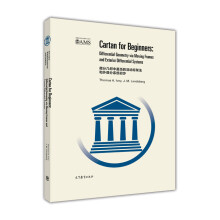Preface
Chapter 1. Moving Frames and Exterior Differential Systems
1.1. Geometry of surfaces in E3 in coordinates
1.2. Differential equations in coordinates
1.3. Introduction to differential equations without coordinates
1.4. Introduction to geometry without coordinates: curves in E2
1.5. Submanifolds of homogeneous spaces
1.6. The Maurer-Cartan form
1.7. Plane curves in other geometries
1.8. Curves in E3
1.9. Exterior differential systems and jet spaces
Chapter 2. Euclidean Geometry and Riemannian Geometry
2.1. Gauss and mean curvature via frames
2.2. Calculation of H and K for some examples
2.3. Darboux frames and applications
2.4. What do H and K tell us?
2.5. Invariants for n,-dimensional submanifolds of En+s
2.6. Intrinsic and extrinsic geometry
2.7. Space forms: the sphere and hyperbolic space
2.8. Curves on surfaces
2.9. The Gauss-Bonnet and Poincare-Hopf theorems
2.10. Non-orthonormalframes
Chapter 3. Projective Geometry
3.1. Grassmannians
3.2. Frames and the projective second fundamental form
3.3. Algebraic varieties
3.4. Varieties with degenerate Gauss mappings
3.5. Higher-order differential invariants
3.6. Fundamental forms of some homogeneous varieties
3.7. Higher-order Fubini forms
3.8. Ruled and uniruled varieties
3.9. Varieties with vanishing Fubini cubic
3.10. Dual varieties
3.11. Associated varieties
3.12. More on varieties with degenerate Gauss maps
3.13. Secant and tangential varieties
3.14. Rank restriction theorems
3.15. Local study of smooth varieties with degenerate tangential varieties
3.16. Generalized Monge systems
3.17. Complete intersections
Chapter 4. Cartan-Kahler Ⅰ: Linear Algebra and Constant-Coefficient Homogeneous Systems
4.1. Tableaux
4.2. First example
4.3. Second example
4.4. Third example
4.5. The general case
4.6. The characteristic variety of a tableau
Chapter 5. Cartan-Kahler Ⅱ: The Cartan Algorithm for Linear Pfaffian Systems
5.1. Linear Pfaffian systems
5.2. First example
5.3. Second example: constant coefficient homogeneous systems
5.4. The local isometric embedding problem
5.5. The Cartan algorithm formalized: tableau, torsion and prolongation
5.6. Summary of Cartan's algorithm for linear Pfaffian systems
5.7. Additional remarks on the theory
5.8. Examples
5.9. Functions whose Hessians commute, with remarks on singular solutions
5.10. The Cartan-Janet Isometric Embedding Theorem
5.11. Isometric embeddings of space forms (mostly flat ones)
5.12. Calibrated submanifolds
Chapter 6. Applications to PDE
6.1. Symmetries and Cauchy characteristics
6.2. Second-order PDE and Monge characteristics
6.3. Derived systems and the method of Darboux
6.4. Monge-Ampere systems and Weingarten surfaces
6.5. Integrable extensions and Backlund transformations
Chapter 7. Cartan-Kahler Ⅲ: The General Case
7.1. Integral elements and polar spaces
7.2. Example: Triply orthogonal systems
7.3. Statement and proof of Cartan-Kahler
7.4. Cartan's Test
7.5. More examples of Cartan's Test
Chapter 8. Geometric Structures and Connections
8.1. G-structures
8.2. How to differentiate sections of vector bundles
8.3. Connections on Fc and differential invariants of G-structures
8.4. Induced vector bundles and connections on induced bundles
8.5. Holonomy
8.6. Extended example: Path geometry
8.7. Frobenius and generalized conformal structures
Appendix A. Linear Algebra and Representation Theory
A.1. Dual spaces and tensor products
A.2. Matrix Lie groups
A.3. Complex vector spaces and complex structures
A.4. Lie algebras
A.5. Division algebras and the simple group G2
A.6. A smidgen of representation theory
A.7. Clifford algebras and spin groups
Appendix B. Differential Forms
B.1. Differential forms and vector fields
B.2. Three definitions of the exterior derivative
B.3. Basic and semi-basic forms
B.4. Differentialideals
Appendix C. Complex Structures and Complex Manifolds
C.1. Complex manifolds
C.2. The Cauchy-Riemann cquations
Appendix D. Initial Value Problems
Hints and Answers to Selected Exercises
Bibliography
Index








 缺书网
缺书网 扫码进群
扫码进群